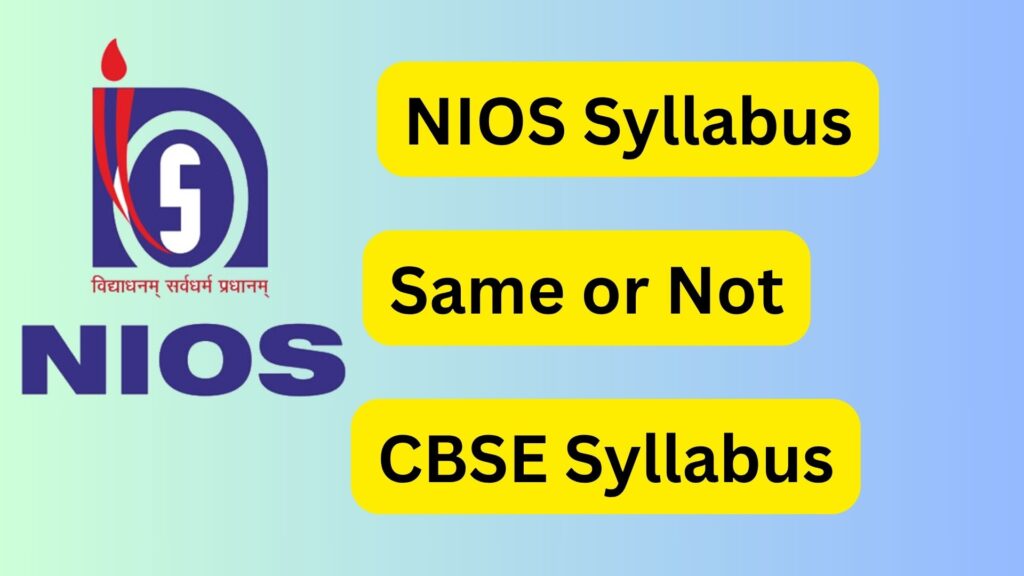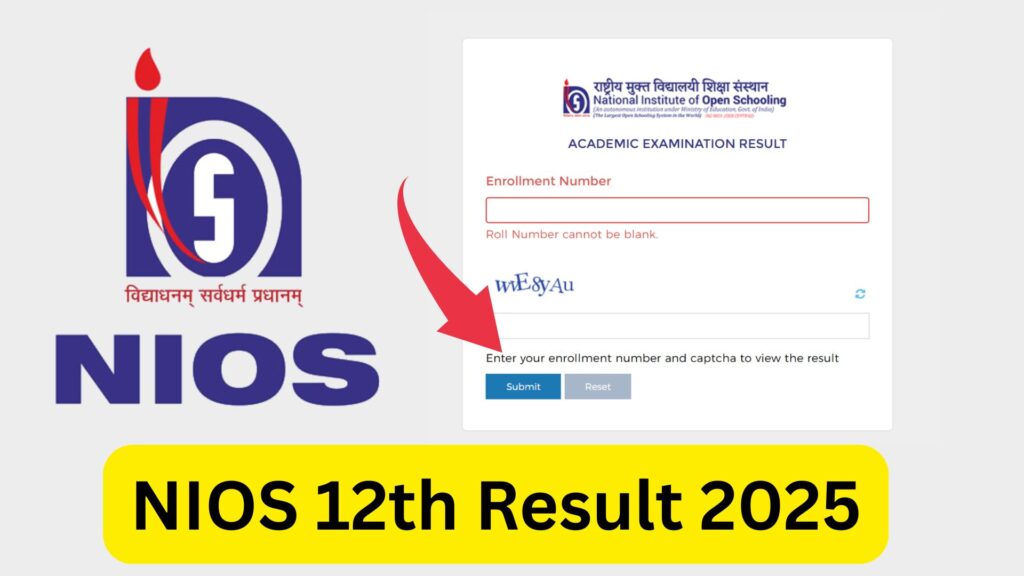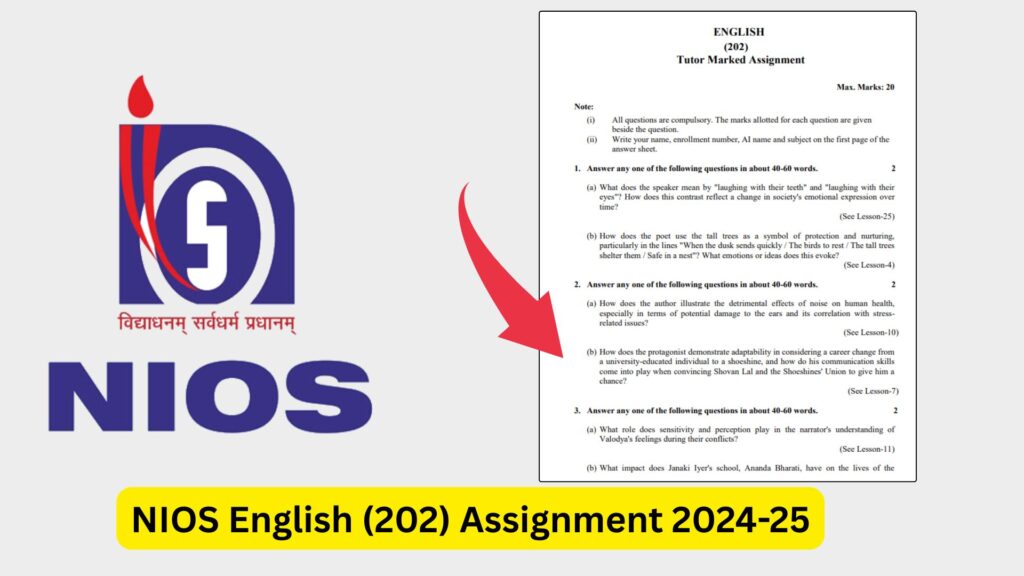Is NIOS Syllabus Same as CBSE? In India, education is provided through multiple boards, each offering a unique curriculum structure and flexibility for students. Among the most prominent educational boards are the Central Board of Secondary Education (CBSE) and the National Institute of Open Schooling (NIOS). While CBSE is a widely recognized national board with a conventional school approach, NIOS serves as a flexible open learning platform catering to a variety of learners, especially those who cannot attend regular schools.

A common question among students and parents is: “Is the NIOS syllabus the same as CBSE?” This article explores this question in detail, comparing the two boards in terms of syllabus, structure, subject offerings, difficulty level, evaluation methods, and academic recognition.
Overview of CBSE and NIOS
Central Board of Secondary Education (CBSE)
CBSE is a national-level board of education in India under the Union Government. It follows the NCERT (National Council of Educational Research and Training) curriculum and is known for its structured academic format, emphasis on theoretical concepts, and a science- and math-oriented approach.
- Target Audience: Regular school students.
- Curriculum: NCERT-based.
- Assessment: Periodic tests, projects, practicals, and board exams.
- Recognition: National and international recognition for higher education and employment.
National Institute of Open Schooling (NIOS)
NIOS is an autonomous organization under the Ministry of Education, Government of India. It was established to provide education to a wide range of students including school dropouts, working individuals, and learners from marginalized communities.
- Target Audience: Students who require flexible learning schedules.
- Curriculum: Based on national curriculum frameworks, adapted for open schooling.
- Assessment: Tutor Marked Assignments (TMAs), practicals, and public exams twice a year.
- Recognition: Equivalent to CBSE and other boards, accepted in higher education and competitive exams.
Is the Syllabus of NIOS Same as CBSE?
1. Core Curriculum Source: NCERT Influence
The syllabus of NIOS is broadly based on NCERT, which is the same source followed by CBSE. However, NIOS adapts this content to suit the needs of open and distance learners. This means while the core concepts remain similar, the structure, presentation, and depth of content may vary.
| Aspect | CBSE | NIOS |
|---|---|---|
| Curriculum Source | NCERT | NCERT-based with modifications |
| Depth of Content | In-depth, structured for classroom teaching | Simplified and flexible |
| Presentation | Academic and theoretical | Learner-friendly and modular |
| Language | English/Hindi | English, Hindi, Urdu, and regional languages |
2. Subject Options and Combinations
CBSE offers a fixed stream system (Science, Commerce, Arts) at the senior secondary level. In contrast, NIOS offers greater flexibility, allowing students to choose any combination of subjects regardless of a defined stream.
CBSE:
- Fixed subject groups.
- Science: Physics, Chemistry, Biology, Mathematics, etc.
- Commerce: Accountancy, Economics, Business Studies, etc.
- Arts: History, Political Science, Sociology, etc.
NIOS:
- Students can choose 5 subjects (minimum) and up to 7 subjects (maximum) from a list of 40+.
- Vocational courses and life skills education are also offered.
3. Practical and Theoretical Balance
While both boards require practical assessments in subjects like Physics, Chemistry, Biology, and Home Science, CBSE has a more structured lab-based approach. In contrast, NIOS conducts practicals through Accredited Institutions (AIs) and assigns Tutor Marked Assignments (TMAs) for continuous assessment.
Comparison Table: NIOS vs CBSE Syllabus and Structure
| Feature | CBSE | NIOS |
|---|---|---|
| Curriculum Framework | NCERT | Based on NCERT, customized for open learners |
| Subject Combinations | Stream-specific | Flexible, cross-stream allowed |
| Learning Style | Classroom teaching | Self-study and online resources |
| Exams | Once a year (Board exams) | Twice a year (April & October) |
| Internal Assessment | Projects, practicals, assignments | TMAs, practicals |
| Language Medium | Mostly English/Hindi | English, Hindi, Urdu, others |
| Student Type | School-going | Open learners, working people, dropouts |
| Recognition | Widely recognized | Equivalent to CBSE, recognized by UGC, AICTE, UPSC, etc. |
Academic Rigor and Difficulty Level
CBSE is known for its high academic rigor. The syllabus is detailed, with emphasis on conceptual clarity and extensive assessments. Students often attend coaching or tuition to cope with the workload.
NIOS, while maintaining academic standards, has simplified content, more visual and learner-friendly material, and less pressure in terms of daily homework, fixed classes, or peer competition. This does not mean NIOS is “easier” in academic value; it is just more adaptable to individual pacing.
Recognition and Equivalence
One of the most important concerns among students is whether NIOS is as recognized as CBSE for higher education and job applications. The answer is yes.
- UGC, AICTE, UPSC, SSC, NEET, JEE all recognize NIOS certificates as equivalent to CBSE.
- Students from NIOS are eligible to apply to IITs, medical colleges, universities, and government jobs.
- Many toppers and successful professionals have backgrounds from NIOS.
Advantages of NIOS Over CBSE
- Flexible Learning Schedule.
- Multiple Exam Attempts in a Year.
- Wide Subject Choices (including vocational).
- Less Pressure and Better Balance for working or specially-abled students.
- Online Course Materials and Video Lectures through SWAYAM and NIOS portal.
Important Links and Resources
| Section | Link |
|---|---|
| NIOS Official Website | https://www.nios.ac.in |
| NIOS Admission Portal | https://sdmis.nios.ac.in |
| NIOS Subject List & Syllabus | https://nios.ac.in/online-course-material.aspx |
| CBSE Official Website | https://www.cbse.gov.in |
| NIOS Student Login | https://sdmis.nios.ac.in/auth |
| TMA Guidelines for NIOS | https://nios.ac.in/student-information-section/tma.aspx |
| NIOS School Updates | https://www.niosschool.com |
FAQ about Is NIOS Syllabus Same as CBSE?
Is the NIOS syllabus the same as CBSE for all classes?
The syllabus for core subjects is broadly based on NCERT, similar to CBSE. However, NIOS modifies the presentation for distance learners.
Can a student who has studied through NIOS appear for JEE or NEET?
Yes, NIOS students are fully eligible to appear for competitive exams like NEET and JEE, provided they meet other eligibility criteria.
Which board is easier—NIOS or CBSE?
NIOS offers more flexibility and simplified study material, making it easier in terms of accessibility. However, success still depends on the student’s effort.
Is the NIOS syllabus recognized internationally?
Yes, NIOS is recognized by many international institutions. It is especially popular among Indian expatriates.
Can I shift from NIOS to CBSE later?
Usually, shifting from NIOS to CBSE mid-way is not common due to different modes of study. However, NIOS certificates are accepted for admissions in CBSE-affiliated colleges.
Are there practicals in NIOS like in CBSE?
Yes. NIOS conducts practical exams for applicable subjects through Accredited Institutes (AIs).
Conclusion
While the NIOS syllabus is not exactly the same as CBSE, it is based on the same NCERT framework with key modifications tailored for open learning. Both boards are valid and recognized equally for further education and career prospects. The choice between NIOS and CBSE should be based on the student’s personal learning needs, goals, and circumstances.
For those needing flexibility due to health, work, or personal reasons, NIOS is a valuable and empowering alternative. For students comfortable with structured learning and daily school, CBSE remains a preferred choice. In essence, both are different paths to the same goal of education and success.

